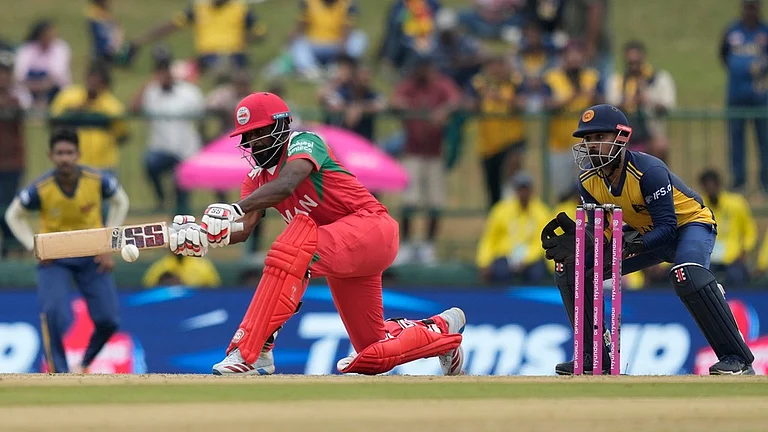The Supreme Court on Monday upheld the Narendra Modi-led Union government's 2016 demonetisation decision and dismissed the petitions challenging it.
The five-judge Supreme Court bench in a 4:1 judgement ruled that the decision-making process of the government was not flawed as it had consulted the Reserve Bank of India (RBI).
The five-judge bench was headed by Justice SA Nazeer. Besides him, the three judges in the majority judgement were Justices BR Gavai, AS Bopanna, and V Ramasubramanian. The fifth judge on the bench, Justice BV Nagarathna gave the dissenting judgement.
In her minority judgement, Nagarathna ruled that the Modi government's 2016 decision was unlawful and the decision should have been made through legislation and not through a gazette notification.
The Supreme Court judgement came on a clutch of 58 petitions challenging the decision of the Modi government to demonetise currency notes in 2016.
On November 8, 2016, Modi announced that notes of denominations 500 and 1,000 would cease to be legal tender and would instead be replaced by new notes of 500 and 2,000. This led to huge shortage of cash and long lines at banks to exchange notes and attracted widespread criticism.
What has the SC majority said?
The SC pronounced two judgements on Monday — one for the four judges in majority authored by Gavai and another dissenting judgement by Nagarathna.
In the majority judgement, Gavai said the Modi government's decision-making process was not flawed as it had consulted RBI. It further said it's not relevant whether objective achieved or not.
"There was consultation between the Centre and the Reserve Bank of India for a period of six months. We hold that there was a reasonable nexus to bring such a measure, and we hold that demonetisation was not hit by the doctrine of proportionality," said the majority judgement.
What did the minority judgement say?
Nagarathna in her minority judgement said the demonetisation decision was unlawful.
Nagarathna differed from Gavai's judgment on point of Centre's powers under section 26(2) of RBI Act.
Nagarathna said the demonetisation was unlawful and it should have happened via legislation, not a gazette notification.
"Parliament should have discussed law on demonetisation, process should not have been done through gazette notification. Parliament cannot be left aloof on issue of such critical importance for country. There has to be great restraint in matters of economic policy, court cannot supplant wisdom of executive," said Nagarathna, as per PTI.
Nagarathna further said that there was no independent application of mind by RBI, only opinion was sought by Centre which cannot be said to be recommendation, according to PTI.
What were arguments of petitioners, Centre?
As many as 58 petitions had challened Modi government's 2016 demonetisation decision.
For the petitioners, Senior Advocate P Chidambaram called the demonetisation deeply flawed and argued that the government cannot on its own initiate any proposal relating to legal tender, which can only be done on the recommendation of the RBI's central board.
Arguing against the demonetisation, Senior Advocate Shyam Dewan pointed out problems with the scheme.
"He pointed out that the November 8th 2016 demonetisation notification erased the responsibility of the RBI by declaring all ₹500 and ₹1,000 notes as invalid tender. However, since these notes were still allowed to be exchanged for valid tender, the Union’s liability to guarantee the value of the demonetised notes stood strong...Divan argued that citizens who were unable to exchange their demonetised currency notes within the stipulated time period due to genuine reasons must be allowed to do so now. He argued that the Supreme Court must issue a general direction to the effect since it had transferred all demonetisation challenges from lower Courts to itself," reported SC Observer.
On its part, the Centre said the matter should not be revisited since no relief can be provided.
Resisting the apex court's attempt to revisit the 2016 demonetisation exercise, the government had said the court cannot decide a matter when no tangible relief can be granted by way of "putting the clock back" and "unscrambling a scrambled egg".
The Centre's argument implies that since the action has been done and we cannot go back in time to do or amend anything, the SC sould not decide on it.
In an affidavit, the Centre told the Supreme Court that the demonetisation exercise was a "well-considered" decision and part of a larger strategy to combat the menace of fake money, terror financing, black money and tax evasion.
The RBI had earlier admitted in its submissions that there were "temporary hardships" and that those too are an integral part of the nation-building process, but there was a mechanism by which the problems that arose were solved.
Slap on government's wriest: Chidambaram on SC verdict
Reacting to the Supreme Court's verdict, Congress leader and Senior Advocate Chidambaram said the SC cleared the decision but has not upheld its wisdom.
"Once the Hon'ble Supreme Court has declared the law, we are obliged to accept it. However, it is necessary to point out that the majority has not upheld the wisdom of the decision; nor has the majority concluded that the stated objectives were achieved," said Chidambaram.
Notably, the Supreme Court majority judgement said it's not relevant whether the objectives were achieved.
Chidambaram further said the minority judgement pointed out the 'illegality' and the 'irregularities' in the demonetisation.
He added, "In fact the majority has steered clear of the question whether the objectives were achieved at all...We are happy that the minority judgement has pointed out the illegality and the irregularities in the demonetisation. It may be only a slap on the wrist of the government, but a welcome slap on the wrist."
Chidambaram further said the dissenting judgement would rank among the famous dissents recorded in the history of the Supreme Court.
(With PTI inputs)


























